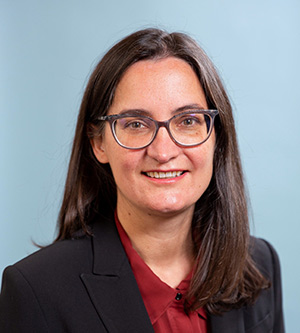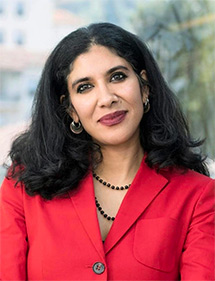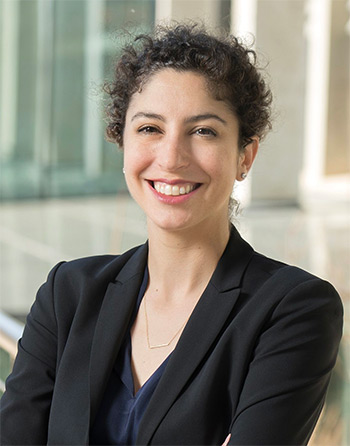As rapid developments in AI transform the practice of law, UC Berkeley Law is meeting the challenges head on. Our faculty, degree programs, research centers, and executive education platforms equip lawyers with the knowledge and skills to lead in this evolving legal landscape.
- Innovative Research: We are committed to advancing AI research, showcasing groundbreaking projects and interdisciplinary collaborations that push the boundaries of technology and law.
- Ethical Considerations: We are leaders in promoting responsible AI regulation, particularly in legal contexts.
- Curriculum Integration: We are integrating AI into the law curriculum, preparing future lawyers to navigate the complexities of technology in legal practice.
- Thought Leadership: Our faculty are thought leaders in the field, informing the conversation on current AI-related legal challenges and trends.
- Interdisciplinary Collaboration: We work closely with other departments at UC Berkeley in a holistic approach to AI in the legal context.
The Law and Governance of Artificial Intelligence
 Examining a variety of laws and governance tools, including court adjudication, legislation, regulatory frameworks, industry standards, and best practices, this course will dive deeply into the intersections of AI and human rights, civil liberties, privacy, intellectual property, consumer protection, and employment law.
Examining a variety of laws and governance tools, including court adjudication, legislation, regulatory frameworks, industry standards, and best practices, this course will dive deeply into the intersections of AI and human rights, civil liberties, privacy, intellectual property, consumer protection, and employment law.
Intellectual Property and Human Creativity in the AI Age
 This course explores how AI has begun to permeate creative activities, which were always perceived to be the sole remit of human beings. The ensuing paradigm shift may have a profound impact on the creative economy and concepts of IP.
This course explores how AI has begun to permeate creative activities, which were always perceived to be the sole remit of human beings. The ensuing paradigm shift may have a profound impact on the creative economy and concepts of IP.
Deep Tech Innovation & Entrepreneurship
 This course explores the challenges of deep technology innovation and entrepreneurship at the interface of business, technology, and intellectual property. Students will work in teams with real-world ventures that have recently been launched by leading research universities, labs, and startups.
This course explores the challenges of deep technology innovation and entrepreneurship at the interface of business, technology, and intellectual property. Students will work in teams with real-world ventures that have recently been launched by leading research universities, labs, and startups.
Copyright, Competition, and Technology
 An overview of current topics at the intersection of copyright and antitrust law. From AI to streaming services and beyond, digital initiatives across industries increasingly implicate both of these complex legal regimes.
An overview of current topics at the intersection of copyright and antitrust law. From AI to streaming services and beyond, digital initiatives across industries increasingly implicate both of these complex legal regimes.
Explore more courses offered in IP & Technology Law in Spring 2025.
Note: Not all courses are offered in all semesters.
UC Berkeley Law’s Student-Initiated Legal Services Projects, open to all students, allow you to develop lawyering and leadership skills while serving the community, as early as your first year of law school. The following projects include AI-focused components.
Legal Automation Workshop
 The legal industry is often seen as lagging in technology, and many legal tasks and processes are conducive to automation. Students in the workshop perform research to identify organizations and high-impact areas where existing workflows can be streamlined through automation, leading to improvements in our clients’ overall efficiency. Students will also participate in the design, build, testing, and delivery of products.
The legal industry is often seen as lagging in technology, and many legal tasks and processes are conducive to automation. Students in the workshop perform research to identify organizations and high-impact areas where existing workflows can be streamlined through automation, leading to improvements in our clients’ overall efficiency. Students will also participate in the design, build, testing, and delivery of products.
Survivor Advocacy Project
 Students will conduct legal research and work closely with attorneys to address the growing trend of AI deepfakes as a form of sexual harassment, and potential reprieve under Title IX. As technology evolves, protections under Title IX are being reconsidered to address new challenges, including the rise of sexually explicit AI-generated deepfakes, which predominantly affect women and cause significant harm including emotional trauma, damaged reputations, and increased risk of abuse.
Students will conduct legal research and work closely with attorneys to address the growing trend of AI deepfakes as a form of sexual harassment, and potential reprieve under Title IX. As technology evolves, protections under Title IX are being reconsidered to address new challenges, including the rise of sexually explicit AI-generated deepfakes, which predominantly affect women and cause significant harm including emotional trauma, damaged reputations, and increased risk of abuse.
Offerings for Legal Professionals
Master of Laws (LL.M.) Degree with Certificate of Specialization in AI Law and Regulation
 Set to begin in summer 2025, the first-ever law degree with a certificate of specialization in AI is now open for applications.
Set to begin in summer 2025, the first-ever law degree with a certificate of specialization in AI is now open for applications.
UC Berkeley Law has long been recognized as the nation’s leading program in IP and tech law. The introduction of the AI Law and Regulation certificate for students in the LL.M. executive track represents a major step forward in this tradition, further equipping legal professionals to navigate the complexities of AI.
The curriculum for the new certificate, designed in consultation with an advisory group of industry leaders, will help students build core skills and knowledge in areas including data privacy, intellectual property (IP), licensing, and risk.
The program is open to lawyers internationally, including those with a J.D. from the United States.
Learn more about the AI Certificate of Specialization.
For more information, please contact llm@law.berkeley.edu.
Executive Education Programs
UC Berkeley Law AI Institute
A three-day executive program exploring the intersection of artificial intelligence, law, and business.
In this program, experts and innovators will dive into the latest developments in AI technology, governance, legal practice innovations, risk mitigation, and regulatory frameworks, among other topics.
By the end program, you’ll be able to provide more effective legal counsel on AI-related matters, make informed business decisions based on real-world developments in technology and policy, understand the ethical dilemmas that characterize AI adoption, evaluate risks associated with AI-powered products and services, and navigate the future of legal practice in the age of AI.
Generative AI for the Legal Profession
An online course designed for lawyers and others in the legal industry who are interested in harnessing the power of deep learning models.
Participants will learn about generative AI, explore a range of use cases, and discover ethical and responsible ways to integrate generative AI into their work.
The program offers interactive exercises and discussions on prompt engineering and managing AI risks such as hallucination and confidentiality. Generative AI for the Legal Profession will help attorneys, paralegals, and legal operations professionals, among others master key AI skills and shape the future of legal practice.
B-CLE — Continuing Education Webinars
 In partnership with the world’s leading practitioners, academics and experts in all areas of technology law and policy, the Berkeley Center for Law & Technology (BCLT) produces top-notch educational and informative webinars covering the full range of today’s most timely tech law topics — IP, AI, life sciences, privacy, cybersecurity and more.
In partnership with the world’s leading practitioners, academics and experts in all areas of technology law and policy, the Berkeley Center for Law & Technology (BCLT) produces top-notch educational and informative webinars covering the full range of today’s most timely tech law topics — IP, AI, life sciences, privacy, cybersecurity and more.
We invite you to view our webinars on B-CLE, UC Berkeley Law’s proprietary knowledge sharing platform. Enrollment and CLE are complimentary. A B-CLE account is required to enroll in all B-CLE courses. Subscribe at no charge.
Faculty Expertise
UC Berkeley Law’s stellar faculty has long been stocked with leading thinkers in technology law, and AI is further expanding their reach. From different corners of the legal and policy world, they’re in position to understand and explain the latest AI offerings, think deeply about the current and potential implications of this burgeoning sector, and highlight places where guardrails are needed — and where a hands-off approach would be smarter.
AI, Platforms, and Society Center
 A joint effort between the Berkeley Center for Law & Technology and the CITRIS Policy Lab, the center offers a unique forum for students, academics, practitioners, and technology companies to explore technical and governance strategies to support responsible technology development and use, including the role of the private sector and state, federal, and international laws, regulations, and policies in shaping these strategies.
A joint effort between the Berkeley Center for Law & Technology and the CITRIS Policy Lab, the center offers a unique forum for students, academics, practitioners, and technology companies to explore technical and governance strategies to support responsible technology development and use, including the role of the private sector and state, federal, and international laws, regulations, and policies in shaping these strategies.
UC Berkeley Law Library Generative AI Resources
 In response to a tidal wave of generative AI news, the Law Library has compiled recent resources on generative AI use in law school and legal practice that are regularly updated. Read an article about the compilation project.
In response to a tidal wave of generative AI news, the Law Library has compiled recent resources on generative AI use in law school and legal practice that are regularly updated. Read an article about the compilation project.
Samuelson Law, Technology & Public Policy Clinic
![]() The Samuelson clinic advances the public interest in a rapidly changing digital age, focusing on civil liberties, intellectual property, and criminal justice. The clinic looks for strategic opportunities in litigation, regulatory and legislative processes to ensure a fair criminal legal system.
The Samuelson clinic advances the public interest in a rapidly changing digital age, focusing on civil liberties, intellectual property, and criminal justice. The clinic looks for strategic opportunities in litigation, regulatory and legislative processes to ensure a fair criminal legal system.
Professor Colleen V. Chien:
How Generative AI Can Help Address the Access to Justice Gap Through the Courts
Professor Sonia Katyal:
Democracy & Distrust in an Era of Artificial Intelligence
Professor Tejas N. Narechania:
An Antimonopoly Approach to Governing Artificial Intelligence
Professor Andrea Roth:
Machine Accusers – The Right To Confront Witnesses in the Age of AI
Professor Pamela Samuelson:
Thinking About Possible Remedies in the Generative AI Copyright Cases
Clinical Professor Jennifer M. Urban:
The Right to Contest AI
Professor Rebecca Wexler:
Testimony Before the U.S. Senate Judiciary Committee’s Subcommittee on Criminal Justice and Counterterrorism
Related Podcasts
The Challenges of Governing AI
With UC Berkeley Law Dean Erwin Chemerinsky, UC Berkeley Law Professors Pamela Samuelson and Colleen Chien, and Stanford Law Professor Daniel Ho
Governing Artificial Intelligence
With Professors Tejas N. Narechania and Rebecca Wexler































